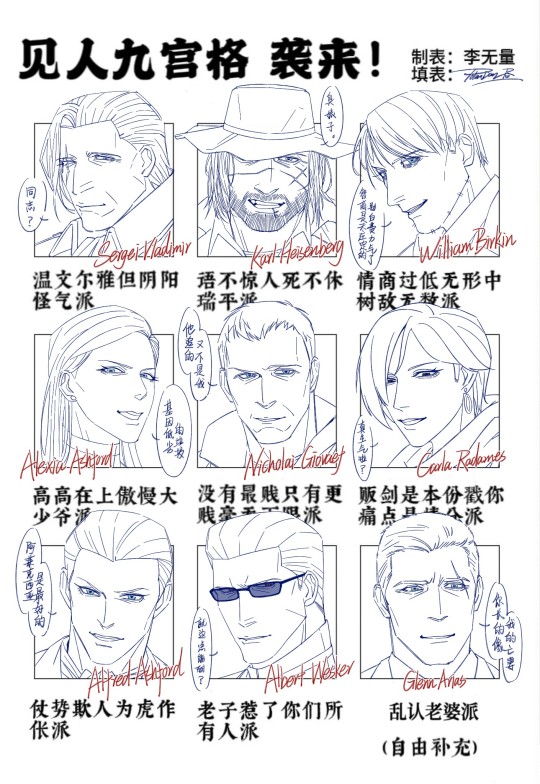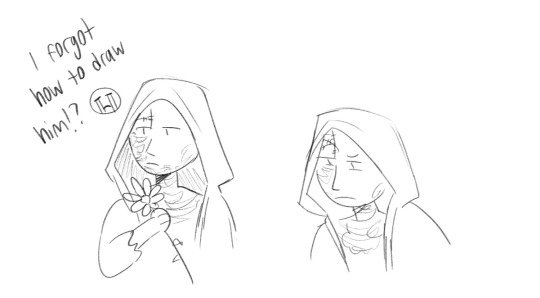Twitter→ @mmyaaym / Pixiv→https://pixiv.net/users/3041556 I am usually on Twitter.
Don't wanna be here? Send us removal request.
Text
Umbrella Pharmaceuticals / One-shot: Ordinary Vanity, Alexia Ashford
youtube
She alternated viciously between the bedroom and the study. The same anonymous crowd chased her through the corridors, attentive to her spurious demands. No one bothered her, the crowd aware that her time was worth more than that of anyone beneath her. But her birth into privilege did not insulate her from suffering a strange sense of distressing estrangement, as if reality were a dream; or she were in purgatory. Reading Heidegger had not helped. His concept of Angst she considered vague and distant, as a phenomenon only applicable to ordinary people. She felt that she was far removed from it, a prey to nameless anguish.
She used to play the piano in the twilight. In contrast to her usual taciturn character, she improvised a melody that stood out for its extroverted melancholy. She did not recognize herself in that composition, however, it came from herself. A moan of pain or a requiem, perhaps. Attracted by the ineffable beauty of those improvisations, her father accompanied her, sitting silently at the back of the room. He never interrupted her or complained when she abruptly plucked a dissonant note that woke him from his deep reverie. It was simply there, like a specter. She became accustomed to the unwelcome assistance of this ghost as she had become accustomed to coping with a corseted lifestyle and an arid paternal-filial relationship.
Her grandmother forced her to succumb to the well of hard work no matter how exhausted she was. With loving words, she would convince her that she should continue studying, continue striving, to be someone great in an uncertain future; because that was her destiny, after all, to be someone great, as was her destiny. She, in spite of everything, did not resist. She lowered her shoulders and bowed her head, aware that she could not go against her grandmother's omnipotent authority for fear of losing her protection against a brutal world she did not know; because her grandmother was demanding, but she knew how to defend her family. But knowing how to defend the family did not entail knowing how to take care of it; and she, her youngest and most remarkable granddaughter, suffered in her flesh the haughtiness of an old woman more concerned with the result than with the means. By repetition over seven years, she had become accustomed to the routine, even grateful for it. However, no matter how satisfyingly rigid it was, she occasionally fell into it. Prey to unmanageable stress, she would seclude herself in her bedroom or study to be alone; she needed to be alone. Before he left for boarding school, her twin brother would open the door and sit on the floor with her to hug her and let her cry it out. After his departure, she would hold back her tears to prove to herself that she was not dependent on anyone, even though she felt tremendously helpless. She must not show even a hint of weakness or she could not look her grandmother in the eye for fear of seeing herself reflected in them as a disappointing being, ostracized to oblivion and eternal humiliation. There was no alternative: succeed or perish.
But there was always something that emerged. A bad gesture, a bad answer, a slightly stooped posture, saddened eyes. The therapy sessions she was forced to attend did not do her much good. She would lie to convince her therapist that nothing was really wrong, that she was just tired; but her attitude reflected the opposite. The anguish was eating away at her state of mind and her bad mood manifested itself with certain aggressive outbursts that surprised her father, but not her grandmother. Her grandmother dealt with her son’s outbursts until they were completely tamed, just as she would with her granddaughter. Her grandmother knew that the outbursts stemmed from an immature desire to rebel against the impositions of elders; rebellion that she nipped in the bud by appealing to the imperative of their status in the world. They could not indulge in such wild displays of irrationality, her grandmother would say and her father would nod. She could do nothing but repress her anger and return to her natural state of self-denial and repetition. Thus she repressed her emotions, but not the anguish; until one night she caught herself thinking about what would happen if she suddenly ceased to exist. If she threw herself from the window to the ground, what would happen?
She never talked to her father about it. Her father was strange to her. She knew that he was still on medication because of his grandfather’s death and that sometimes he also locked himself in the office, watching TV at maximum volume and ignoring the existence of his fellow human beings. Her relationship with him was cold because it was as if he himself did not want to ingratiate himself too much with his children for a reason he hid behind an absent look. He was sympathetic and attentive, fulfilling his role as a father, but at the same time absent. For this reason, that rare moment they shared while she played the piano understood how much more emotionally close they were to each other, like an instant in which both, without mediating a word, understood each other. But silence did not make up for the lack of contact, so that presence was not enough to appease the anguish she felt and could not share with anyone except her own loneliness.
The anguish that nothing would change; that what awaited her was not a future of glory, but of desolation, that all she would know in life would be sadness and isolation, incomprehension and a permanent self-demand for being someone she had not decided. She knew that her father was complacent, incapable of aspiring to anything better, but she still resisted.
Still, she felt that she could be something more; that there had to be something more than simple obedience and ordinary vanity.
10 notes
·
View notes
Text

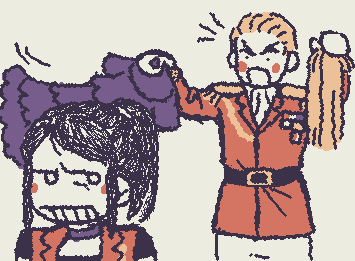
I finally played Code Veronica so I made a Wigglypaint drawing to go with my other Wigglypaint drawings of all the Resident Evil games!
47 notes
·
View notes
Text
[First Edition] Umbrella Pharmaceuticals - Chapter 28: A House on the Prairie
FIRST EDITION — DISCLAIMER
The chapters are edited in random order and in an inconsistent manner. The content of the edited chapters is revised, and there are inconsistencies with the unedited chapters.
Summary:
June 1978. Oswell E. Spencer receives the Ashfords at his country house in Essex, England.
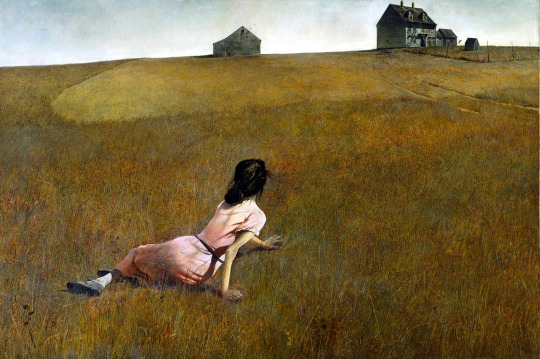
Christina's World by Andrew Wyeth, 1948.
English spirit
A solitary cumulus of cirrus clouds cast a shadow over their evening stroll through the lush grove. They walked along an irregular path of moldy cobblestones, among clusters of exotic flowers, outlined bushes and ancient oaks, holm oaks, elms and chestnut trees. Oswell E. Spencer, recently returned from Luxembourg, had invited Alexander, and his children, to spend the evening at the estate to discuss some important matters. The estate, Spencer State, was the Spencer family’s ancestral home, a country house that the twins Alfred and Alexia, who were visiting for the first time, found very similar to Ashford Hall. However, although both residences were built in the Victorian style, Spencer State lacked the personality of Ashford Hall. Spencer State was spartan, with hardly any ornamentation. In contrast, Ashford Hall lavished the visitor with a symphony of statues, reliefs, arches, pillars and gargoyles of classical and Gothic inspiration, which left no doubt as to the owner’s tastes. Alfred did not understand the reason for this contrast, so, once they were received by Oswell and his staff at the main entrance, he asked:
“Why ...” he asked as they crossed the sumptuous hall, “why is the front not decorated?” he addressed Oswell. Oswell took a couple of steps back to stand beside him.
“For the representation of the English spirit, young man. My grandfather, Jeremiah Peyton Spencer, served as Governor of India and in compensation for his invaluable service to the country, he was rewarded with the earldom that I have inherited. As a demonstration of his loyalty to the Crown, my grandfather erected this mansion as the most faithful representation of the English spirit: austere, severe, pragmatic, imperturbable, rational; that is what this house is. Why do you ask, son? Has it caught your attention?”
Alfred nodded.
“My house is different,” said the boy.
“Northern taste, I suppose,” he joked. “Or palatial taste, prince.” He smiled at him knowingly. He quickened his pace to close the gap with Alexander. “Did you hear the boy? Because now I’m left wondering too. Is it a Catholic preference?”
Alexander had listened to their exchange and clarified:
“A mixture. Ashford Hall is inspired by Italian palatial architecture and Catholic cathedral architecture. Our ancestors, Charlie’s children*, lived in Italy before returning to Scotland. Veronica built the house in his memory, and because she wanted a building that stood out from the rest.”
“Interesting,” said Oswell.
The adults had tea and biscuits before tackling the important matters. The children made do with homemade blueberry muffins and milk, which they devoured very slowly. The adults entertained themselves with colored paper. The children entertained themselves admiring the deer heads hanging on the walls. But, because the adults were too busy with their piles of papers, the twins decided to ask Theodore, the butler, if they could explore another part of the house. Theodore, with Oswell’s permission, instructed Patrick, Theodore’s son and the butler’s first assistant, to open the double door of the guest lounge on the first floor, where they were, so that they could go straight down the hall to the first right turn, where the chapel was.
The children, followed by Patrick, followed the directions. Patrick pointed to a double oak door:
“The chapel, masters.” He made way for them.
Alfred let out a disappointed snort. The chapel was in the same style as the house: austere, devoid of decoration and with a wooden cross on a pedestal in the center. Once again, Ashford Hall won: the house chapel had a gigantic golden altarpiece, profusely decorated with jewels, artifacts, saints, paintings and other Catholic icons. For Alfred, that was the archetypal chapel. This thing seemed tacky to him.
Alexia sat down on the first pew, looking at the cross. Alfred sat down next to her, on the far right, by the aisle. Patrick watched them from the doorway.
“The English spirit,” Alfred muttered in English, disappointed.
“The English spirit,” Alexia repeated, “is a fairy tale.” Alfred listened to Alexia. “A fairy tale that adults make up to feel good about themselves. Adults are like big children,” she smoothed the wool skirt printed with the blue and black tartan of the Douglas clan, “they believe in their own fairy tales.”
“Like the English spirit.”
“Like believing in God. Do you believe in God, bràthair*?”
“Masters,” Patrick called. “Lord Spencer wants you to return to the hall as soon as possible.”
Alfred and Alexia got up. After the eternal tea, and a couple of cigars smoked by Oswell, their host offered to take them for a walk around the estate. Unlike during the welcome at the Spencer residence, Alfred and Alexia led the procession, with Alexander and Oswell some distance behind. From what Alfred could overhear, the two had engaged in a soporific debate about the upcoming elections.
“I see Thatcher as the most capable of the capable. The most ideal of the whole clique of ragged weasels that infects the Conservative Party. Losing to Labor for almost a decade! What will be next?! Mao Zedong becoming Queen?!” exclaimed Oswell.
“There will be a change of government. There is talk of the Labor Party’s decline due to its incompetence in managing the Seventy-Three crisis*. The workers and the middle class want the country to get back on track, as it was before, a promise that Labor has not kept. Ours want to bring down the government to end nationalizations and the criminal inheritance tax,” argued Alexander. “Labor will finally fall because of its success.”
“That’s where Margaret comes in. Do you know who Friedman is? He’s part of Thatcher’s inner circle. They call themselves New Liberals. Their approach to a 21st-century economy is just what Umbrella needs to really take off.”
“Liberalization?”
“I’ve done the math. If we outsourced the factories to China, Umbrella’s profits would double. We’d end every fiscal year in growth.”
“It could be.”
“Thatcher must win.”
Mortally bored, Alfred pulled Alexia’s hand. They slipped off the path, heading nowhere. They crashed their small bodies into a bush, which cracked from the impact, and then they trotted in a straight line until they came across a wide-trunked oak tree, far from the eye of their guardians. They huddled in a large hollow between the protruding roots, with Alexia’s head on her brother’s shoulder and he face down. Alfred’s tweed jacket and shorts were stained with mud and leaf litter that had accumulated among the roots. Alexia’s tweed jacket was also stained, and her skirt had become frayed, probably from the collision with the bush. Supported as they were, she pulled on a thread hanging from the bottom edge of the skirt.
Ban-Ban
"…Ban-Ban is a complete jerk." Oswell lit a cigarette from a metal packet he was carrying in his brown cotton jacket.
“He called me a faggot and attacked me about school. He made up a story that I abused the new kids,” Alexander said in a low voice, distracted by the activity of the few insects swarming around the flowers, his hands in the pockets of his blue tweed trousers.
“Impossible.” Oswell took a puff. “I don’t believe for a second that you’re a bad person,” he quipped. “Besides, who hasn’t abused someone in those schools? Why did you just beat them up, is that it? Wasn’t there anything else?” He narrowed his eyebrows with a sibilant pout.
Alexander cleared his throat, but did not reply.
“A macho man as macho as you abusing the youngest kids in the barnyard like that? Please,” he smiled sarcastically.
Alexander stopped dead in his tracks, forcing Oswell to stop against his will.
“I want to kill that asshole,” he said.
“Ignore him,” Oswell instructed. “He’s a piece of shit. I advise you: next time you come to fuck my cousin, use the service back door. I’m sure my brother-in-law caught you, that’s why he was so pissed off.”
Alexander, head down and sour expression, resumed walking.
“Okay,” he conceded with frustration.
“Let’s do each other a favor: you fuck Morgana in peace and Ban-Ban doesn’t come to heat my head. In peace?” He stopped and held out his hand to Alexander, who shook it, but Oswell caught his by surprise to say: “A little bird told me that Morgana had her first orgasm with you, is that true?” Oswell’s surgically aligned teeth shone through his hyperbolic smile. Alexander smoothed his hair with his free hand, responding with a satisfied half-smile and narrow eyelids, blushing. “She tells me that your cock is as long as a pole, and that she feels your pelvic thrusts like a tunnel boring its way through Everest. Pam, Pam, Pam!” Oswell imitated the coital movement. “And that your repertoire is wider than missionary. I was stunned. Is that true?” Alexander nodded shyly. “How big when it is erect?”
“Eighteen.”
“Jesus...” Oswell swallowed the remaining tobacco in one sitting, taken aback. He was left with the cigarette filter between his fingers. “I don’t believe you.”
Alexander subtly grabbed the bulge in his trousers with one hand.
“Take it out.”
Ignoring the indecent invitation, Oswell got rid of the filter, storing it in a compartment of the packet. Disturbed, and aware that he would lose by too great a margin, he took a quick look around to get the image out of his head of a cock with a blonde wig, its glans protruding above his trousers like an Amazonian anaconda. As he took in the surroundings, he felt that something was missing. It could be...
“Sasha.” Sasha adjusted his trousers. “Where are your children?”
Lucifer
Alfred nodded, dead tired. Alexia lay on his left shoulder. The birds jumped from branch to branch, singing to each other and to the children, keeping them awake.
“Do you believe in God?” Alexia repeated the question.
“Yes,” he nodded, yawning. “Grandma says we’re a miracle. God performs miracles, so God exists,” he replied, shaking the mud off his knees.
Alfred thought he heard a voice in the distance.
“God isn’t the only one who performs miracles,” Alexia objected.
“Who else?”
Alexia looked him in the eye from her uncomfortable position on his shoulder.
“Lucifer.”
“The devil?! Why would you say that?!” Alfred was shocked.
“I am a miracle of Lucifer.” Alexia squeezed herself into her place, hugging her legs. “Or am I not?”
Lost
“Alfred?! Alexia?!” Alexander bellowed.
“The best contraceptive is dealing with other people’s children!” Oswell smoothed out his jacket, already wrinkled from fighting every bush, tree, flower and stone that came his way.
“Alexia?!... Alfred?!”
They entered the forest where they thought the children might have slipped away, to the left. Oswell consulted the time on his gold watch with encrusted diamonds. Thirty-seven minutes until dinner.
Alexander advanced at a military pace, distancing himself from Oswell, the latter content to cover the rear. Unable to control himself, he punched off the lower branch of an oak tree, cutting the knuckles of his right hand. A trickle of blood flowed from the open wound. Twilight was settling over the estate, unleashing the shadows and, behind them, darkness.
“Alexia?!” he shouted.
“Dad?”
A small voice replied from somewhere. Alexander turned around to find out where it came from. A blond head appeared from the bushes on his right.
“Alexia? Are you there?” He walked towards the spot.
The blond head doubled up and emerged from the bushes, first Alexia and then Alfred, disheveled and dirty. Alexander sank to one knee, deeply relieved. Alexia approached him to say:
“We heard your screams.” Unmoved. Alfred rinsed his eyes with his hands.
“You scared me to death,” he said in Scottish Gaelic. “You know very well that you mustn’t disappear without telling me.” He hardened his voice. Alfred put his hands behind his back and bowed his head to feign regret, a gesture that did nothing to appease his father. “What have I told you about the danger of wandering around on your own? About what could happen to you if no one is looking out for you?” Alexander raised his voice. Alfred saw that Oswell was waiting for them in the distance, smoking a cigarette. “Alfred!” He focused his attention on his father. “What did I tell you?”
“It’s dangerous,” Alexia replied in the same language.
“Insufficient. What else?” Alexander ordered.
“Your hand is bleeding,” said Alfred.
Alexander’s face reflected disappointment. Alexia was clutching her skirt.
“Do you want to get killed?” he continued.
“But...” Alfred complained.
“Enough!” Alexander ordered his son to be quiet with a dry and imposing voice. “Children who wander alone expose themselves to being killed, kidnapped and raped. Is that what you want for yourselves?!” He stood up as tall as he was, puffing out his muscles so that they stood out through the fabric. Alfred began to whine. Alexia held her own expressionless.
Alfred’s tears fell to the floor. Alexander lowered his shoulders and, standing, embraced both children. He caressed their hair tenderly.
“I don’t want you to get hurt, understand?” He continued to caress their heads. Alfred swallowed his tears. “I don’t want to lose sight of you.” Alexia nodded under Alexander’s arm. Alfred wiped away his tears. “I’m sorry I shouted at you. I was very scared.”
Alexander separated himself from their bodies.
“Give me your hand. We’re going back to the house.”
Alfred and Alexia obeyed, each holding one of his hands.
“I’m sorry I shouted at you...” Alexander thought out loud.
Oswell was waiting for them, smoking.
Dinner
Oswell relegated the care of the twins to the housekeeper, Olga Radu. Olga, an aging Romanian with a strong accent, took charge of washing them for dinner. In a bathroom on the first floor, equipped with a ceramic bathtub with gold edges, Olga cleaned them with the same delicacy as a washing machine spinning at full power, combed their hair as if raking through a potato patch and dressed them in a clean change of tweed as if they were rag dolls. Alexia complained about the slap she received. Alfred, still dejected from the earlier scolding, wondered what would happen if Olga accidentally hit herself in the mirror. Ready for dinner, the housekeeper kicked them out of the bathroom. In the corridor, their father was waiting for them, leaning against the wall, serious but calm, with a band-aid on his knuckles. His anger had passed. Alfred was no longer dejected.
“Thank you, you may leave.”
The housekeeper bowed to Alexander before leaving. The three of them were alone in the hallway.
“Dinner time,” he announced, and patted them on the head as if to indicate that they should be the first to move.
Oswell received them in the main dining room of Spencer State, which rivaled that of Ashford Hall in sumptuousness: Caraza marble floors, paintings from private collections, classical statues, a colorful Renaissance fireplace in the background, tables and chairs from the French court and gargantuan handcrafted crockery more than a hundred years old on an elongated rectangular table. Oswell chose to sit with Alfred on one side, and with Alexander and Alexia on the opposite side, in confidence. Theodore and Patrick waited in a corner with the trolley, ready to proceed with the English-style service. Oswell raised a hand to signal the start of dinner.
The starter consisted of a soup of onion, mushrooms and aged cheese that was not a hit with the children, but was enjoyed by the adults, who washed it down with white wine. During the starter, the adults chatted about mutual friends, about Oswell’s artistic acquisitions and about how much Alexander disliked a type of Umbrella that the twins were not familiar with. Alfred and Alexia exchanged mocking faces, holding back their laughter. After the soup, Theodore and Patrick replaced their plates with a dish of Atlantic langoustine matured in duck fat and beetroot. A main course that was not a hit with the children either, but it went down well with the adults. Alexander and Oswell went for the second glass of wine, intending to drink a few more.
“I’d like to discuss something with you briefly, before the wine goes up faster than inflation during the gold standard,” suggested Oswell as he gutted the langoustine. Unfortunately, Alfred’s langoustine came gutted.
“What is it?”
“Jamie.” Alexander frowned. Oswell laughed. “You never liked that old cowboy, clansman?” Alexander tore the head off the crayfish using the knife and fork. “He’s staying in Raccoon, doing what he loves.” Alexander shrugged. “I’ve hired two of his students for Arklay. Albert and William, I think their names are. A couple of teenagers.” Alexia listened attentively. Alfred was struggling with the crayfish tongs.
“Age?”
“Eighteen, sixteen, approximately. I must call Tony.” Alexia stirred the remains of the crayfish with her fork. “Minors are always problematic.” Alexander nodded very slightly; his eyes fixed on his plate. “Here comes dessert!”
Theodore and Patrick served Alexander, Alfred and Oswell a simple chocolate mousse with berries, and Alexia a lemon mousse with mango syrup. After mentioning Jamie, James Marcus, a man the twins only knew by name and who was from Texas, Patrick helped them to get up from the table and led them to the bedroom. Alexander kissed them on the forehead before leaving with Oswell to continue drinking and chatting.
A house on the prairie
Patrick guided the pair of twins to their bedroom on the second floor. On the way, and behind the back of the butler’s first assistant, Alfred and Alexia ventured to touch some of the Chinese ceramic vases that decorated the surface of the sideboards placed in the labyrinthine corridors. In a slip of the tongue, Alexia almost knocked over a silver candelabrum with three lit candles, which she immediately replaced. Alfred covered his mouth so that Patrick would not hear his accomplice chuckle. After the near incident with the candelabra, they entertained themselves by looking through the windows, still with the baroque Venetian curtains drawn, but they could only glimpse an impenetrable moonless night. Alexia, disappointed, said that the moon made people go lunatic. Alfred joked, sticking out his tongue and making the stereotypical crazy fingers gesture.
“Masters,” Patrick urged them from the end of the corridor.
The twins met up with the butler’s assistant, bowing their heads. The three continued walking at the same height, although this time Patrick’s eyes were glued to their respective necks. The remaining stretch between the window and the bedroom assigned to the twins was covered in just a few seconds. To the twins’ absolute dismay, Olga Radu was waiting for them at the door of the room, looking as if she were relishing their suffering. Alfred and Alexia cheered up and held hands. Patrick said goodbye with a nod of the head, thus handing over custody of the children to the housekeeper. She smiled sardonically, about unleashing her bad temper on the pair of unprotected minors. In any case, the twins would counterattack by accusing the master of the house of any slight negligence on her part.
Olga took a huge bundle of keys from the pocket of her old-fashioned dress. She managed to choose the right key first time and slid the door open with humiliating slowness. The twins entered in silence as the housekeeper held the door open for them. The bedroom disgusted them with its insignificance. Like the rest of the house, it was not without exquisite ornamentation, and a pile of probably unpublished paintings saturating the wall, but its size paled in comparison with their father’s stately room. Oswell showed the family the bedroom that had belonged to his parents and which he had now given to Alexander to spend the night in, this being the most spacious and majestic guest bedroom in the mansion. On the contrary, not only did they find that room tiny and bleak, but Oswell hadn’t even bothered to show it to them during the brief tour of the residence. Alfred slumped dejectedly. Alexia approached the only double bed in the room, on which they had placed the quadrangular suitcase that the twins shared. The room was even smaller than their single rooms at Ashford Hall.
Alexia opened the heavy leather suitcase without waiting for Olga, still standing in the doorway, to help them unpack it. Alfred approached his sister and sat down on the edge of the soft mattress, covered by silky bed linen. Alexia pulled on a garment and took off her pajamas, a T-shirt, and animal-print pants. Olga remained unperturbed, like a mummy, but Alfred knew that deep down she was laughing at them. Pajamas in hand, Alexia went to the adjoining bathroom and locked the door. Alfred was left alone with the Romanian.
The Romanian woman looked at him like someone waiting for a circus monkey to perform a trick. It made him uncomfortable. He began to feel nervous. Olga did not move, petrified in place like the pinnacle of a cathedral. To avoid her unpleasant presence, he took refuge in the suitcase, searching for his pajamas among the belongings. He touched a piece of cotton and pulled it to reveal the T-shirt and pajama pants with a spaceship print. There was no way he would change in front of her, so he sat on the other side of the bed and waited. Olga approached the bed, without saying or doing anything else. Luckily, Alexia did not take long, reappearing dressed in her animal pajamas. Alfred ran so fast to the bathroom that he caught his jacket pocket on the doorknob. He pulled it on and hastily took it out, praying that the housekeeper had not been paying attention.
He put his pajamas on top of the sink, after checking that Alexia had thrown her clothes on an empty shelf and her shoes with socks in the empty space underneath. He hated Olga. He looked at himself in the mirror. He looked good. He liked himself. He smoothed his hair a little more. He took off his jacket, his shirt and his sleeveless undershirt. He smoothed his hair a little more. He threw the top along with his pants onto the shelf, and the shoes along with the socks into the space below, on top of Alexia's. All the clothes fell to the floor. He put on his spaceship pajamas, presumably inspired by the Apollo program. Self-confident, although disgusted by Olga, he left the bathroom noticing that he had forgotten to lock the door and neither of them had brushed their teeth, but they would use the latter as a weapon against the housekeeper.
Olga followed Alfred to collect the clothes and put them away. Alexia had got into bed, taking the right-hand side as they came out of the bathroom, so Alfred had to take the opposite side. Olga came back from the bathroom and closed the door. While Alfred got into bed, the Romanian woman tidied up their clothes. Then she put their suitcase in the wardrobe. The effort caused her face to wrinkle grotesquely, to Alfred’s delight. When she had finished, the housekeeper bowed, wished them a formal good night, turned off the lights and closed the door.
Silence.
Alfred turned on the lamp on his bedside table. Alexia submerged herself inside the sheets. He turned off the lamp. He turned on the lamp. Turned it off. Turned it on. Turned it on. Turned it off. Turneditonturneditoffturneditonturneditoff. He turned it on. Apart from the double mahogany bed without a canopy (without a canopy!), the very simple wardrobe without a dressing room, the two very small bedside tables and the very ordinary chest of drawers, the bedroom did not stand out for anything other than the army of paintings that invaded the four walls. The canvases depicted colorful impressionist landscapes, or so it seemed to him, from the stippled outlines of the shapes. Boring. He inspected them again before going to bed. That one.
He got out of bed and ran to the chest of drawers, where the painting hung below three other more colorful pieces. He climbed on top of the bathroom chair to take it down. Then he returned the chair to its place so that nobody would notice and got into bed, holding the treasure with both hands. Leaning against the headboard, he examined the work.
A dazzling desert of fine sand, white as ivory, merged with the cerulean horizon of a warm morning. A solitary black figure walked along the crest of the dune to nowhere, followed by a row of footprints imprinted on the ground. At first, he associated the landscape with the vague stories he had heard about Stanley Ashford’s travels around the world, especially to the deserts of Arabia. In one of the halls of Ashford Hall there was a photograph of him posing with Arab laborers and camels in the middle of the desert. On the back of the photograph, taken in 1911, was the inscription ‘In search of Irem, the city of pillars’. He did not know what Irem was or why his great-great-grandfather was so far away and surrounded by so many strange people because Alexander refused to tell him the truth until he was at least an adult. He sulked the last time, but it did not work. A disappointment. Speaking of backs, Alfred removed the frame from the small painting to look behind the canvas: Stendall, 1903.
“Boo.”
He covered the anodyne signature with the frame lid. He contemplated the scene more closely. He observed the somber profile of the figure. He had a feeling. A surreptitious chill ran through his body like a stampede of horses. Suddenly, he felt devastated, as if he himself were that figure, in the middle of nowhere; being nobody. The loneliness of the figure, of himself, demoralized him, even more so when that desert seemed nuclear to him. Television recreation of a large-scale nuclear war portrayed the cities of the future as radioactive dust deserts. That scared him. It made him feel powerless and deeply distressed. Alexander, who knew some very strange people connected with this matter, assured them that the chances of a nuclear war were minimal to nil; to ignore the sensationalist reports and news they were putting out on television. He said: we fight major wars in third countries as the lesser of two evils. Alfred was not completely convinced, but he could not think of anything to say to contradict his father either. He had to make do, unable to deal with that damned feeling of anguish? Alexia called it angst, and she also felt it sometimes, although for different reasons. What was her angst? Did adults feel it too? She did not know. For some reason, their father never talked to them about his feelings, appearing evasive most of the time, as if he were hiding something from them that he would not reveal until they were older. Their grandmother, on the other hand, always seemed to be in a good mood by his side.
“Angst,” he murmured in a Dutch accent.
But naming it amplified his unease. As if exorcising a demon, Alfred hid the painting under his pillow. He turned off the light and closed his eyes. He wanted to forget, unsuccessfully. The desert returned to him like the call of the wild. Suddenly, a second vision crept in through the back door of his brain. A woman in the middle of a leaden meadow stretched out a starving arm towards a lonely house. They saw it at the MOMA, when the museum’s president invited them and the Campbells to the opening of a collection.
That was the first time he felt angst. He identified with the troubled character as if it were himself. Why? At that moment, he asked Alexia:
“She is defenseless. Alone. Like us.”
Those words distressed him. Alone. That was why, because they were alone? His relatives told them to always stay together for safety. He understood the background to the warning, he was not a stupid child, however, there was something else; something more disturbing, regurgitating at the bottom of the abyss. Loneliness, not for protection, but for existence. Without Alexia: he would be nothing, no one; a traveler in the desert; a pathetic woman who crawled into the void of a ramshackle abandoned house. And he hated it. He hated thinking about it because it made him feel terrible, with a knot in his stomach, with the dizzying sensation that his tiny dream world was breaking into a million irreparable pieces. By chance, Alfred came into the world with someone who gave a name to his thoughts, who made him feel good and accompanied during the monotonous passing of the days, facsimile moments of a constrained lifestyle devoid of excitement beyond double lives and occasional nonsense.
He hugged his sister from behind, asleep for some time. He would endure walking through the desert, crawling through a meadow, if she was with him.
GLOSSARY
Bràthair, brother in Scottish Gaelic.
Charlie, Prince Charles Edward Stuart (1720-1788).
Seventy-three, 1973 oil crisis.
11 notes
·
View notes
Text
Alfred, Alexia, and the Dragonfly
The infamous video of Alfred and Alexia torturing a dragonfly and feeding it to the ants can be found twice on Rockfort Island. The first time, you see it in the room with the Lugers and then again in Alfred’s office as the startup of his PC. Of course, it has a deeply person meaning to Alfred. We know about his obsession with his sister, and Alexia is in there as well. Maybe the video is the only one with her or the last one that was taken before her cryogenic sleep. It makes sense that Alfred would hold dear something like this. But is it just about Alexia, or is there more to it? After all, we even have to watch it twice.
The twins do not talk the entire time and barely interact during the video. The only noteworthy interaction happens during the last scene, in which Alfred and Alexia share a knowing gaze. The way they look at each other makes it clear that there is more to the whole scene than what meets the eye. It had a deeper meaning, which only they could understand. A secret they share with each other. Words are not necessary.

When I first played Code Veronica X, I assumed the video mainly existed to show the cruel and twisted nature of the twins, while it also foreshadowed what Alfred would become. But after replaying the game last year, I changed my opinion. The video isn’t about Alfred and Alexia’s general cruelty or torturing of defenseless creatures. The content represents something more personal to them - their revenge on Alexander.
It was never said when the video was recorded, but the twins aren’t small children anymore. Based only on their appearance, I would estimate them to be between 10 and 12 years old. Now, considering the content of the video, I think it was recorded after Alfred discovered the truth about their origin and after they came up with a revenge plan as the earliest possible date. However, it is more likely that they had already executed their plan some time before.
Let’s take a closer look. First of all, the visual language. The ants symbolize Alfred and Alexia. Alexia sees herself as an ant queen and refers to Alfred as a soldier ant. The dragonfly is Alexander. It is more obvious for Alexia’s third form, but Alexander’s mutated form resembles a dragonfly too. He has three appendages on his back, similarly arranged like three of four wings of a dragonfly. Additionally, these appendages are long and thin, like insect legs. In Darkside Chronicles, he even uses them to move around. Also, Alexander’s real legs are bound together with the rug, which makes his lower body look vaguely like the elongated abdomen of the insect. The belts even give it a segmented appearance.
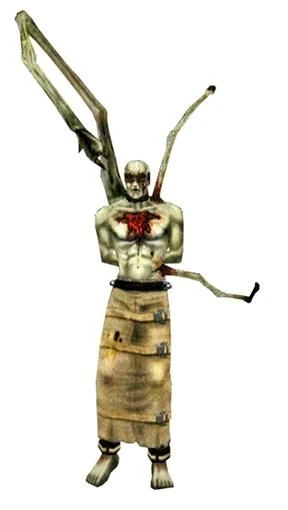

The last similarity isn’t related to the real animal but to an item. To activate the self-destruct system, you have to assemble a dragonfly key. On the underside of this key is a prominent red jewel in the middle of its thorax, similar to Alexander’s exposed heart.

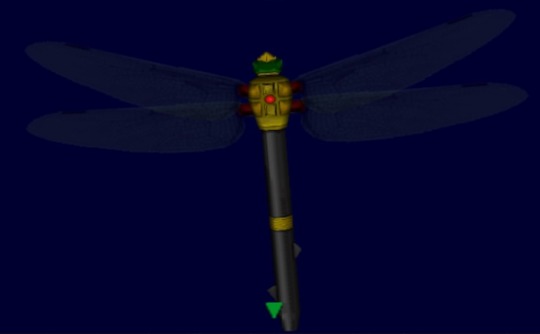
The dragonfly in the video is rather large. It has a blue abdomen with black markings and a yellow thorax. I tried to find out what dragonfly species we see there and found three possible candidates. One is the green hawker (Aeshna viridis), another is the southern migrant hawker (Aeshna affinis), and the last one is the emperor dragonfly (Anax imperator). (I’m not a dragonfly expert, though. Maybe there are other ones that fit better.)
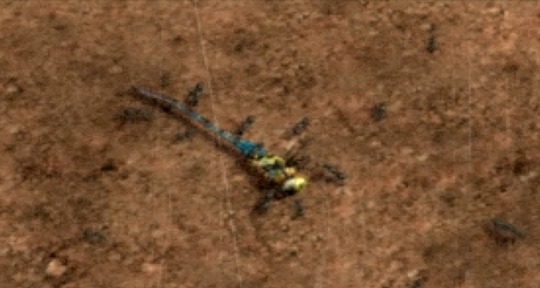
The abdomens of the green hawker and southern migrant hawker are also blue, the thorax is yellowish-green, and they have black markings on their bodies. The emperor dragonfly has an apple-green thorax rather than a yellow one, but it would fit the other criteria. Other dragonfly species with a similar color palette have either more black markings, differently colored spots on the abdomen, a different body shape, or are too small. In all three cases, only the males have this coloration. The females are green or yellowish green instead of blue. Selecting a male dragonfly specifically could be another reference to Alexander. As for the emperor dragonfly and the southern migrant hawker, contrary to the green hawker, they also inhabit Great Britain, which delivers another connection to Alexander. And while Alexander is, of course, only an earl, not an emperor, an emperor dragonfly could still refer in a wider sense to his peer status.
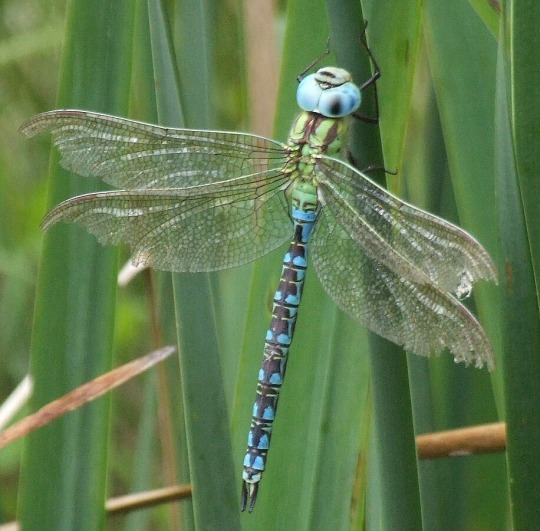
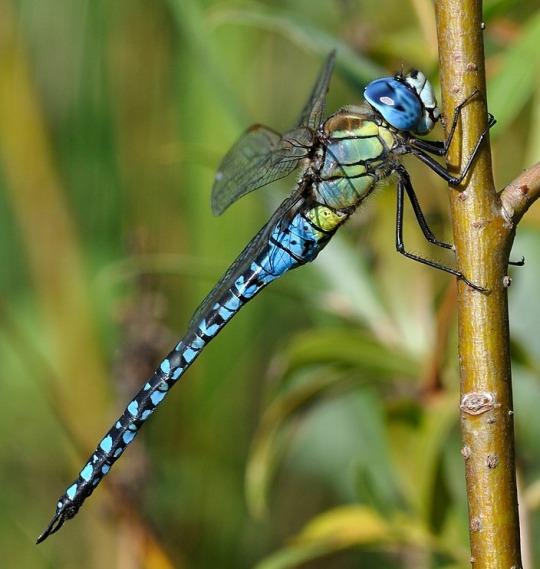

From left to right: green hawker (male), southern migrant hawker (male), emperor dragonfly (male).
The general events of the video reflect what happened to Alexander. Only Alfred interacts with the dragonfly. He was also the one who initiated the revenge plot after discovering the truth about himself and Alexia, as well as the one who suffered subjectively more under his father. Alexia stays passive the whole time and only watches her brother, while in real life, she is the one who has carried out the experiments, not Alfred. However, even if she does not join her brother here, Alexia still contributes by providing an instrument to execute the allegorical revenge - her ants (and the virus in reality).
Instead of simply killing the insect, Alfred rips out its wings, making it incapable of flying away. Like the dragonfly, Alexander was still alive when he met his fate. The twins tranquilized their father before Alexia injected him with the virus, which caused his transformation. Afterward, Alexander’s confinement continued, and he was chained for years in agony, probably awaiting his death if he was still capable of having coherent thoughts.
The dragonfly’s death is not in vain. Feeding the insect to the ants serves a purpose. The ants can feast on it, and the colony can grow. Alexander’s life wasn’t wasted either. Alexia directed Alfred’s revenge plans from simply killing their father to using him for research purposes. Their “useless father” could contribute for once to Alexia’s research and the Ashford family. Even though the experiment was a failure, Alexia was still able to use the data she required from it for her benefit.
Why all the effort with the cryptic symbolism? Alexander was a terrible father. Probably not intentional, but this isn’t an excuse. He took the childhood of the twins for the sake of his own ambitions. He used Alexia to fulfill what he could not achieve and disregarded Alfred for not being as intelligent as his sister. Finding out that they were the result of a genetic experiment was the final straw, especially for Alfred. Their father then got what he deserved, according to them. Alfred hated Alexander with a passion. It must have been a great feeling to get rid of him, and to celebrate it, he (maybe Alexia too) wanted a keepsake. Direct photos or videos of their father were out of the question. Alfred even wrote in his diary that they have to be careful so that Harman (their butler) doesn’t discover what has happened to Alexander. The dragonfly video works well. It is cryptic enough that no one could understand its meaning without more background knowledge. People who see it randomly would assume it is a disturbing and slightly eerie home video. Alfred and Alexia, on the other hand, know exactly what it is about. It’s so important to Alfred because it does not only show Alexia but also their victory over Alexander. The insects are nothing more than involuntary actors. The real dragonfly and what is happening to it is secondary. The symbolic meaning behind the dragonfly’s death struggle holds significance.
Some notes as a closure that didn’t fit in the rest of the text: What makes the video so creepy, except for the circumstances you find it in, is the twins’ acting. Without them and out of context, the dragonfly video wouldn’t even be that unsettling if you consider some facts. The video was recorded in the Antarctic base. Dragonflies do not inhabit Antarctica. This means the dragonfly was bred there. The twins did not randomly catch it for the purpose of torture. What’s the purpose of breeding dragonflies? I assume it’s for (virus) research. We know that Umbrella performed experiments on other invertebrates. So, if dragonflies are bred in the lab anyway, why not use some as a protein source for the ants as well? More common insects for feeding ants would be mealworms and meal beetles, house crickets, flies and fly larvae, roaches, and plant lice, though. Also, dragonflies are predators and attack everything they can overpower, including other dragonflies. And unlike ants, they can fly. It makes sense to remove the wings first to prevent it from flying away or attacking the ants. Sure, ripping out its wings and not killing it first is still cruel, but at least the ants will take care of this soon.
25 notes
·
View notes
Text
Umbrella Pharmaceuticals - Chapter 22
I
Dr Ward repositioned the metal frames of his glasses. The two of them had gathered in an office lavishly decorated with heavy volumes of various disciplines such as psychology, sociology and anthropology. The boy was pleased when he spotted the name of his great-grandfather, Arthur Ashford, on one of them. Dr Ward held out the thick book, entitled On the Control of the Social Mass, an equally groundbreaking and controversial essay on the mechanisms that enable the perpetuation of the statu quo. Dr Ward revered Arthur Ashford as his main academic point of reference. In his honour, and as the greatest milestone of his career, he ran for and was elected rector of the preparatory school that the noble scholar founded for his offspring. A school to which his six-year-old great-grandson, whom he interviewed to assess his aptitude and character, and then some. The Stewarts referred to it by the euphemism "distinguishing". To "distinguish" a Stewart was to educate them in a certain way of being and a certain way of thinking. This time, the Stewart to be distinguished was Earl Ashford's heir apparent, Alfred, a slim-bodied boy with androgynous features, generally quiet, though anxious and impatient; gifted, but not to the level of genius of his twin sister; very suspicious and naïve.
If Alexia had been born an ordinary person, she would have shared a chair with her older brother. If Alfred had been born an extraordinary person, Lord Ashford would not have turned to Dr Ward to educate his son. On the contrary, he would have shared a chair with his younger sister to be personally educated by Lord Ashford. On this fact, Alfred lamented that Alexia was not with him. Dr Ward asked him why and he said that he felt good to have her with him. He had read about the supposed psychic connections between twin siblings, but Alfred and Alexia were not identical twins and his yearn for his sister seemed to stem from an ordinary childish desire for play. In any case, he reviewed his notes and went on with the interview. It was time to evaluate the child's conception of human society.
“Alfred, why don't we talk a little about our society?” He lit his pipe without bothering to keep a safe distance from the interviewee.
The boy began to tickle the tweed on the sleeves of his jacket, not knowing what to say.
“In our society there are rich people and poor people; people with a lot of money and people with little. Why do you think poor people exist?”
“Poor people are stupid," Alfred said bluntly.
“And why are they stupid?” continued Dr Ward with a laugh.
“Uhm... They have no education.”
“School education or family education?”
“Both. My family says they don't know how to behave.”
“All right.” Smoked. “What place does your family have in our society?”
“We're the best.” Alfred smiled proudly.
“Why are you the best?”
“We are special. We are smart. We work hard.”
“Has your father or any other member of your family ever told you about the origin of your fortune?”
“My great-great-grandmother Veronica had a lot of business.”
“What kind of business?”
“Factories. Land in Asia.”
“Aha. Have they told you about those businesses?”
“A little bit.”
“Like what?”
“That she employed a lot of poor people. Many families from the North[1].”
“Did you know that children used to work in factories back then?”
“Yes. I read about it in the history books.”
“What do you think about it?”
Alfred turned his attention to the statuette of a horse. He had stopped scratching the tweed and Dr Ward couldn't tell whether the boy was uncomfortable with the question or thinking about the answer.
“They are children like me, but they are poor. They work for us.”
Dr Ward noted the comment. Lord Ashford had asked for an earl to match, and he would produce what had been agreed.
II
Obedience brings discipline.
Discipline brings unity.
Unity brings power.
And power brings life.
The audience applauded. Having done his job, James Marcus retired to his office. Miller turned to the congregation of students waiting in the centre of the main hall.
“Dr Marcus' first lecture has been scheduled for tomorrow morning at 8:00 a.m.”
The crowd dispersed. Miller looked around for the pair of minors.
“You guys. Come over here.”
The two minors approached him at the same time. He could not identify either of them.
“Can you remind me of your names? So I can put you on the list of residents," he lied.
“William Birkin.” A blond-haired, acne-ridden teenager appeared, neatly combed and apparently well-dressed. This was supposed to be the fifteen-year-old they had hired at Harvard.
“Albert Wesker.” Another blond teenager with smooth skin and a stoic attitude. He wore jeans and a red bomber jacket like James Dean in Rebel Without a Cause. He had been hired at Columbia [2] after leaving West Point[3] without graduate.
“You were seventeen, weren't you?” Miller turned to Albert Wesker.
“Yes.”
“When do you turn eighteen?”
“August ninth.”
Miller mentally recorded the date.
“Do you like your bedroom?” Miller had put them in the same room so as not to mix them with the older ones.
“Yes. Not bad," said Birkin, with his hands behind his back.
“Yes," Wesker replied dryly.
“Good. In that case, I'll leave you to it.”
Miller hurried off to his office. William Birkin and Albert Wesker were left alone in the lobby.
III
The bedroom lacked any decoration and the furnishings were restricted to the basics. A curtained double window ensured privacy. The wooden slats under her feet did not creak and her mattresses rested on a solid wooden frame that looked decent. A couple of simple wardrobes for storing clothes and a couple of desks with chairs. Nothing else. To the left, by the door, Wesker slept. On the right, on the long back wall facing the entrance, Birkin.
They agreed to nothing. As soon as they entered, Wesker threw his backpack on the bed, marking his territory. Birkin was more careful, leaving the suitcase next to the headboard of his own. Wesker made him nervous. From the looks of him, he looked like a tough guy, and he didn't like that at all. Wesker looked like the bullies who fucked him up until he was twelve, when his college entrance got him off the hook. He had learned to distance himself as much as possible from those cretins and to retreat into himself to minimise the damage. For this reason, he focused on getting his desk and cupboard in order, ignoring the other boy's presence. But the other boy was not ignoring him. He felt its sibylline blue eyes on the back of his head, watching him.
Birkin nervously swallowed. Out of the corner of his eye he saw Wesker pull a small metal object out of his backpack and tuck it under the mattress, probably thinking Birkin hadn't noticed, and lay down on the bed. Birkin finished and sat down in his desk chair to do whatever it was.
“Where are you from?” Wesker spoke suddenly behind him.
“Baltimore.” He turned around. “I'm from Baltimore. And you?”
“New York.”
Birkin swallowed again. His reclining posture lessened the sense of menace, but did not encourage him to let his guard down.
“Where in New York? State or city?”
“City. Brooklyn.”
“Ah. I've never been there.”
Quiet. Birkin began to rock the stiff metal chair, and Wesker lay back, staring at the ceiling.
“And what are you doing here?” Birkin ventured to satisfy his curiosity about his roommate's profile.
“Same as you," he replied.
Birkin wiped the sweat from his hands on his trousers. He recognised his stupidity.
“Where did you study?” he rephrased.
“Columbia.”
“Oh. On a scholarship?”
“Yes.”
“I came from Harvard. A bachelor's degree in microbiology.”
“How old are you?” Wesker cut him off.
“Fifteen.”
Wesker turned around, and now he was the one with his back to her. He didn't understand the move. Was that supposed to be a good sign or a bad sign? He hadn't hit him yet, though.
Yet.
Notes:
[1] North of England. In this case, from Yorkshire to Northumberland. [2] Columbia University, New York. [3] United States Military Academy (USMA) (West Point).
6 notes
·
View notes
Text
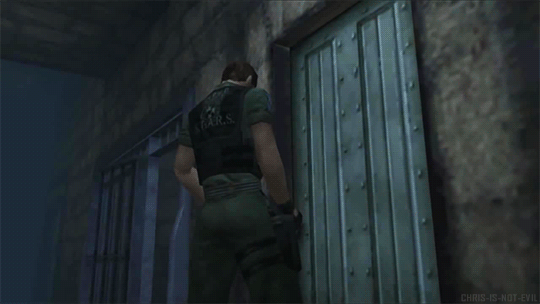
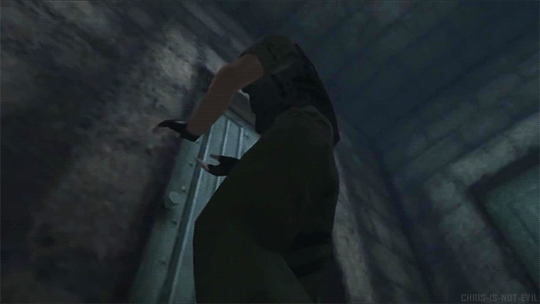
Talking about Chris being the protective big brother that he is, remember in Code Veronica when Chris tried to break a metal door open bare-handed because he heard Claire crying and locked up inside?
That was before he bulked up. So now that he's all muscled up, they had to make him get infected and helpless too in Death Island because if they didn't give him some handicap somehow, you know Chris would rip the prison bar open with his bare hands to get his sister out, and the movie would end way too early.
485 notes
·
View notes



